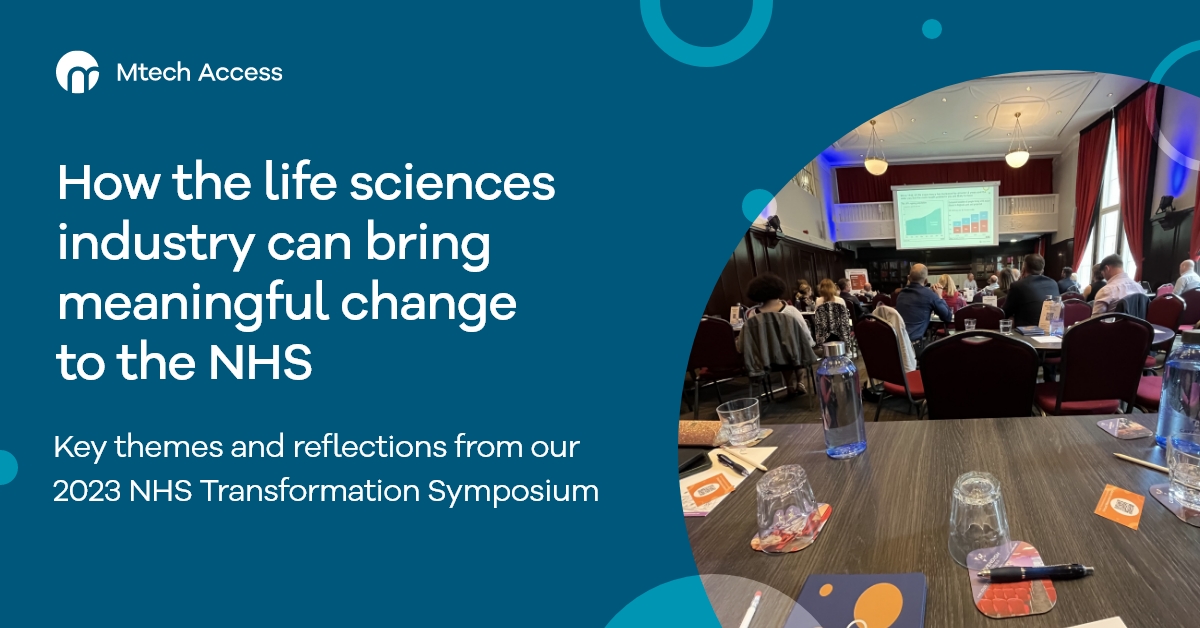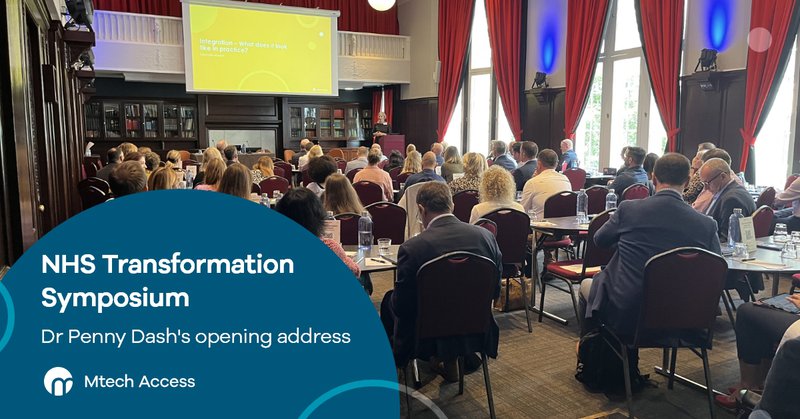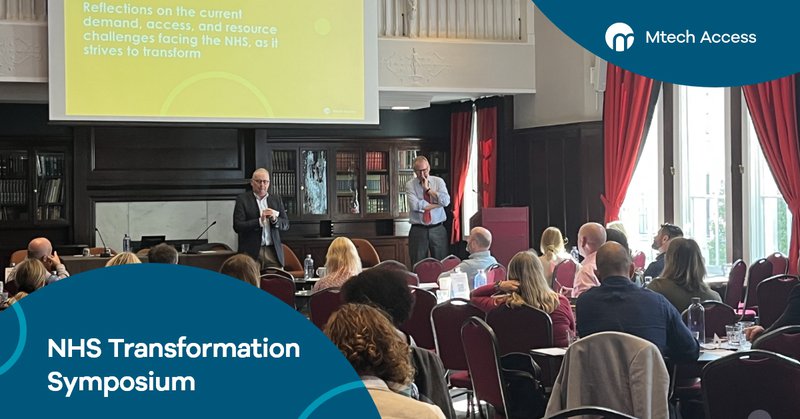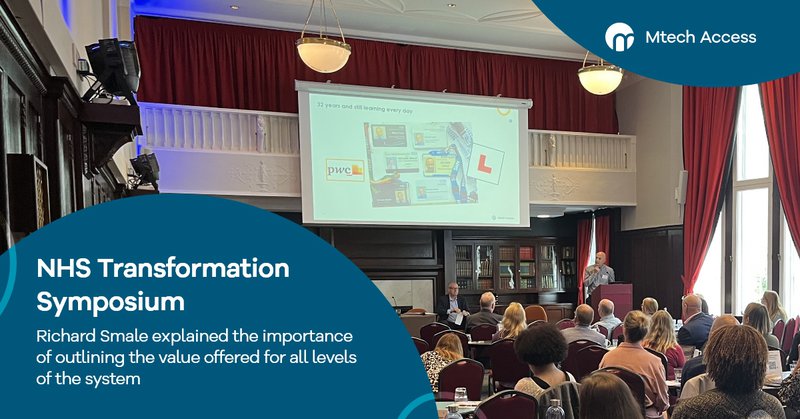
How can the life sciences industries and the healthcare sector work together to deliver real change? An overview of the key themes discussed at our NHS Transformation Symposium.
It’s no secret that the NHS faces challenges, including funding constraints, workforce limitations, an ageing population, and advanced medical technologies. Not to mention the fact that many of the integrated care systems (ICSs) are still finding their feet. To overcome these challenges, it is vital that there is transformation of clinical services and pathways.
That’s no easy task, and the speakers at our NHS Transformation Symposium last week focused on the role of the life sciences industry in bringing meaningful change to the NHS.
The main takeaway from the Symposium was that we can only succeed if the NHS, regulatory bodies, and life sciences industry combine strengths.
The challenges with adopting new technologies – why is the NHS not doing XYZ?
One of the questions that our speakers frequently receive is “why doesn’t the NHS implement a particular technology?”.
Dr Penny Dash (Chair of North West London ICS) was our first speaker of the day. She emphasised that, whilst the NHS recognises the benefits of new technologies and treatments, there is considerable pressure on ICSs; their hands are often tied by central government with regard to resource allocation, and budgetary constraints limit their ability to be flexible.

Although a hospital or ICS might be keen to adopt a new technology to help staff work more efficiently, mandated staffing levels can make efficiencies and cost savings difficult to realise. One of the examples given was the use of artificial intelligence (AI) to support early cancer diagnosis.
Paul Miller (Non-Executive Director, BaNES, Swindon and Wiltshire Integrated Care Board [ICB]) explored this in the final session of the day. He explained that, due to current budgetary constraints, many ICSs are now running at a significant deficit. Therefore, any innovation should look to demonstrate cost savings within the financial year to increase the chance of it being adopted.

NHS leaders are time poor
Our speakers also highlighted that NHS leadership faces a continuous onslaught of immediate challenges. Recently these have included RAAC (Reinforced Autoclaved Aerated Concrete) in hospital buildings, capacity issues in emergency departments, and ongoing strike actions. Every day there’s a new fire to put out.
As a result, senior NHS leaders may only have 30–60 minutes a week to consider new technologies and innovations. Value propositions and pitches must be succinct and consider the full clinical pathway, to allow NHS leaders to easily assess new technologies.
What can industry do?
To encourage the NHS to adopt new technologies, the industry must make them aware of the innovations available. If senior NHS leaders don’t know what innovations are accessible, then they can’t drive the transformation of services and embrace new opportunities.
There can be a problem with lack of communication between the industry and the NHS. Often, key individuals vary across ICSs, leaving those in industry unsure who to contact. That’s where Mtech Access can help, as we can direct them to the right individuals and test ideas with our NHS Associate network.
To effect change, innovation must work both locally and at scale. Richard Smale (Executive Director of Strategy and Transformation, BaNES, Swindon and Wiltshire ICB) emphasised that any new technologies must have value propositions that meet the needs of all NHS stakeholders at the different levels of localisation.
From neighbourhoods to whole system levels, any innovation that struggles to provide value to all levels of the system will have a much harder time achieving buy-in from the wider healthcare system.

Collaboration is key
All our NHS speakers emphasised their willingness to work with industry. They were keen to help industry better understand the NHS, its needs and challenges, and the art of the possible. They also recognised the importance of NHS leaders gaining a better understanding of industry and the constraints it faces.
Our Chief Innovation Officer, Prof. Phil Richardson, encouraged attendees to embrace collaborative ways of thinking and consider working with other suppliers in the healthcare market to bring the NHS comprehensive solutions.
This may involve developing forums where companies and the NHS are able to talk, at an above-brand level, and find effective solutions, which may involve more than one company.
Presenting comprehensive, targeted evidence
Several of our speakers spoke to the need for comprehensive and appropriate evidence for the innovations developed by industry. Clinical trials, pilots, NICE approval, and case studies of implementation are invaluable in demonstrating that a technology has the potential to meaningfully transform the NHS.
Ensuring that your evidence asks and answers the questions of NHS key decision makers is vital to adoption. It is all too easy to ask the wrong questions in a study and then collect evidence that doesn’t demonstrate the value of your technology to the NHS.
Building collaborative and ongoing conversations with the NHS allows industry to understand the metrics and evidence that resonate with decision makers.
A call to action: uniting for a better future
Reflecting on the insights and perspectives shared during the Mtech Access NHS Symposium, it is clear that transformation is a collective journey.
The challenges facing the NHS are formidable. Yet, they are not insurmountable when we work together. Across the UK, innovative technologies are being implemented that will deliver real change for the benefit of patients and staff.
Mtech Access are committed to fostering and nurturing these collaborations, acting as a bridge between the NHS and industry. By facilitating meaningful dialogue and partnerships, we aim to support the NHS in achieving its transformational goals and delivering improved healthcare outcomes for the UK population.
We extend our gratitude to all participants, speakers, and partners who made this symposium a success. Together, let us embark on this transformative journey, united in our purpose to revolutionise healthcare for a brighter and healthier future.
If you would like to work with us and other companies at an above-brand level, please email info@mtechaccess.co.uk to learn more about our plans in this area.
Please find resources from the symposium, including the event slides, in our event resource library.
To work with our experts on optimising your NHS engagement, evidence, and market access strategies, please email info@mtechaccess.co.uk.


